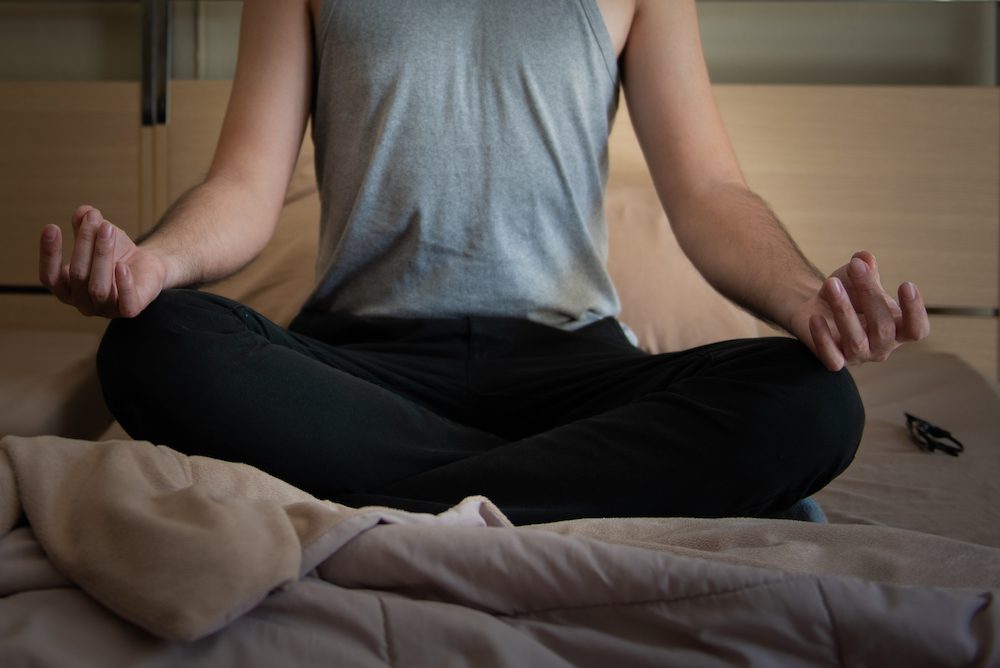Medical Disclaimer: The following content should not be used as medical advice or as a recommendation for any specific supplement or medication. It is important to consult your health care provider prior to starting a new medication or altering your current dosage.
Meditation is a practice that involves focusing and calming the mind. There are several different styles, but in general, meditation is meant to connect the mind and body to promote mindfulness, awareness, and relaxation.
In the last decade, the number of people who report meditating on a regular basis has more than tripled. One of the main factors driving the surge in meditation is a quest for better sleep, since as many as 2 in 3 adults experience occasional insomnia or difficulty falling and staying asleep.
Once considered outside the bounds of conventional medicine, health experts now recognize meditation as a beneficial practice that may help reduce stress and improve quality of life. We’ll discuss the most recent scientific evidence supporting meditation for sleep and how to meditate in bed and fall asleep fast.
Meditation for Sleep Tips

- 1 Pick a quiet space with plenty of room.
- 2 Grab a few pillows if you need and get into a comfortable position.
- 3 Block out distractions that pull your focus from the meditation.
- 4 If you need a little help, try a guided meditation.
- 5 Have patience and be kind to yourself when you’re just getting started.
Guided meditation, breathing exercises, and relaxation techniques are all great additions to a nighttime routine.
Can Meditation Help You Sleep?
Mounting research shows that meditation practices may help you sleep better. In particular, mindfulness meditation has been shown to improve the symptoms of insomnia as well as boost sleep quality.
Meditation is a practice that helps you train and develop how you respond to external and internal stimulation. The aim of meditation is to help you become more aware of your present condition and inner thoughts. Observing your thoughts and feelings can help you become less reactive to stress and better at tolerating uncomfortable emotions.
In the past, Western health experts largely ignored meditation as a treatment option. But when researchers began putting meditation to the test, it became clear that meditation may be beneficial for certain health issues like sleep problems.
More than a dozen high-quality studies show that meditation can have a lasting, positive effect on sleep quality. Practicing meditation may even be more effective than educational measures like learning about sleep hygiene and may be just as effective as other proven treatments for chronic sleep issues like exercise and cognitive behavioral therapy.
Although the evidence so far is promising, researchers are still working to better understand the relationship between meditation and sleep. It’s also important to keep in mind that self-guided meditation is not a substitute for professional medical treatment. If you experience chronic sleep issues and frequently feel tired during the day, talk with your doctor about your symptoms.
How Does Meditation for Sleep Work?
Researchers are not completely certain why meditation improves sleep, but there could be many reasons. Meditation can reduce stress, and it might be particularly helpful when a person has trouble falling asleep because of worry. Meditation and mindfulness training help people notice their thoughts without becoming caught up in them, which can allow them to detach from their thoughts enough to fall asleep.
Meditation has been studied for its effects on improving pain associated with fibromyalgia, back pain, migraine, rheumatoid arthritis, irritable bowel syndrome, osteoarthritis, and other disorders. Since pain often disrupts sleep, relieving pain may improve sleep. Sleeping well can further relieve pain, which could then lead to even better sleep over time.
Meditation might also improve sleep directly, even in people not experiencing heightened stress or pain. Whether you are facing worries or not, meditation can induce a relaxation response that might help prepare for sleep. People who meditate also experience changes in brain activity, which carry over into sleep.
How Does Meditation Help With Sleep?
Meditation may help improve sleep by promoting relaxation and helping you better cope with stress. A regular meditation practice can improve your ability to understand your thoughts and feelings, enabling you to respond better to stressful situations and regulate emotions in a healthier way.
Stress is a major contributor to insomnia, so it follows that learning to manage stress and calm your mind may help you sleep.
The evidence to date even suggests that meditation may create structural changes in the brain that can lead to positive shifts in behavior and benefits for certain health issues. For example, meditation may lead to brain changes that improve emotional and information processing.
Together, these effects may help explain improvements in sleep quality from meditation. Researchers theorize that meditation improves sleep by:
- Decreasing focus on negative thoughts
- Reducing emotional reactivity
- Improving stress management
How to Meditate Before Bed
Meditation can help you destress and improve your sleep, but if you’ve never meditated before, it can be hard to know where to begin. To get started, try incorporating a short and simple meditation practice into your evening routine.
- Find a comfortable, quiet place to sit.
- Choose a meditation posture that helps you feel relaxed. For example, you can try sitting in a chair or on a cushion on the floor with your legs crossed.
- As you sit, try to keep your back upright but not too tense.
- Allow your hands to rest wherever feels natural.
- Start to notice the sensations of your body, like the feeling of your feet as they rest on the floor. Notice any areas that seem tight or tense. Allow yourself to soften and relax.
- Notice your breath as it naturally flows in and out. Feel where your breath sits as you inhale. It may be in your chest or in your stomach. Notice how the feeling changes as you exhale. Try to focus your attention on the sensation of your breathing, in and out.
- Your mind may start to wander away from your breath. Don’t worry when this happens. A wandering mind is natural and inevitable. Simply take a moment to acknowledge that your mind wandered without judging yourself. Then gently bring your focus back to your breath.
- Try to sit with this practice for five minutes.
When starting a new meditation practice, it can be good to keep things simple. But if you’d like to experiment, there are several different types of meditation you can try.
Mindfulness Meditation
One of the most popular and well-studied forms of meditation is mindfulness. Mindfulness is a form of meditation that involves focusing your awareness on the present moment in a non-judgmental way, similar to the practice outlined above.
The intention of mindfulness meditation is to retrain your mind to focus on your immediate surroundings and away from unhelpful or negative thought patterns. There’s a great deal of research examining mindfulness meditation and sleep and the evidence shows this type of meditation has a positive impact on sleep quality.
Body Scan Meditation
Body scan meditation involves systematically focusing your attention on the physical sensations in each part of your body. This can help you feel more connected to your physical body and notice areas where you tend to hold tension. With greater awareness, you can learn to relax and relieve that tension.
If you’re wondering how to meditate in bed, consider trying body scan meditation. This style of meditation is usually done lying down, making it a good choice for meditating at bedtime.
Mantra Meditation
Also known as Transcendental Meditation, this style of meditation involves focusing your attention on a specific word, phrase, or sound. Mantra meditation can help clear and calm your mind while refocusing your thoughts toward a positive mantra.
Your mantra can be as simple as a single word like “breathe.” It can also be a longer phrase that helps reinforce your intention of preparing for sleep.
Movement Meditation
Movement meditation combines the mental focus of meditation with physical activity. There are a variety of forms this type of meditation can take.
- Walking meditation: This type of movement meditation simply involves incorporating mindfulness into your daily walk.
- Yoga: Yoga involves combining specific physical movements with meditation and intentional breathing.
- Tai chi: A practice that originated in China, Tai chi combines meditation with martial arts and movements that mimic dance.
Movement meditation can help add exercise to your daily routine, which may improve your sleep. Just be careful not to perform more intense movement meditation later in the evening as it may make it harder to fall asleep.
Steps to Prepare for Meditation
Meditation takes practice and requires your full focus and attention. Taking steps to prepare for your meditation session can help prevent distractions and set you up for success.
- Choose a space: Make sure to pick a relatively quiet area in your home with somewhere to sit. While some people like to use a meditation pillow, you don’t need special equipment. You can sit in a chair, on the floor, or try laying down in bed if you’re meditating as part of your bedtime routine.
- Get cozy: Wear something comfortable such as loose fitting clothing or workout attire. If you’re getting ready for bed, pajamas are also an excellent choice. Grab a few pillows to use as bolsters so you can find the coziest sitting position.
- Block out distractions: Meditation is all about training your attention. Limit distractions that are likely to pull your mind away from your meditation practice like background noise from your TV, smartphone, or other device. You can also try using earplugs to block out other noises that may be outside of your control.
- Consider guided meditation: Starting a new meditation habit from scratch can seem daunting at first. If you feel like you need a little help, try a guided meditation. There are many resources online as well as sleep apps that offer free, pre-recorded sessions to walk you through the steps and help kickstart your meditation practice.
- Be patient with yourself: If you’re new to meditation, remember to keep your expectations within reason. You probably won’t feel like an expert after your first night of practice. It can also take time to learn what style of meditation works best for you, so remember to have patience and be kind to yourself.
Other Benefits of Meditation
In addition to improving sleep quality, meditation may provide benefits in a wide range of other areas. Although more high-quality research is needed, the evidence so far is encouraging.
- Mental health: Many people choose to practice meditation to help reduce feelings of stress, and research shows that meditation may have concrete benefits for people struggling with anxiety and depression.
- Weight and eating habits: Meditation may help people who are overweight or obese increase their awareness around their food habits. This may lead to healthier eating patterns and weight loss. However, more research is needed to determine whether meditation can help with long-term weight management.
- High blood pressure: Almost half of American adults have hypertension or elevated blood pressure. Research shows that meditation can lead to significant reductions in blood pressure. The American Heart Association also promotes meditation as an inexpensive, complementary approach for reducing heart disease risk.
- Substance use disorder: People dealing with addiction may also benefit from meditating. Consistent mediation practice can help a person understand what emotions and situations make them more likely to relapse. It can also help them identify and deal with cravings in a more constructive, healthy manner.
Does Meditation Have Risks?
Health experts generally consider practicing meditation to be very low risk, but more research is needed to look for possible negative side effects. There’s evidence that some people may experience unwanted symptoms from meditation practice including :
- Anxiety
- Depression
- Disorientation
- Attention and memory problems
Meditation focuses the attention inward which can sometimes lead to heightened emotions like anger and sadness. This reaction may be more likely to occur in people who have a history of mental health issues, trauma, or substance use disorder, all of which can also impact sleep.
Keep in mind that the number of people who have a negative experience with meditation is relatively small, and the risks are not any higher than those associated with not engaging in any type of treatment. However, more high-quality research is needed to better understand the possible risks of meditation.
It’s also important to remember that meditation should not be a substitute for seeking medical or mental health treatment from a professional. Discuss any concerns about sleep issues with a doctor, and ask for guidance when trying meditation or any other new complementary health approach.
References
Ask the Sleep Doctor
Have questions about sleep? Submit them here! We use your questions to help us decide topics for articles, videos, and newsletters. We try to answer as many questions as possible. You can also send us an email. Please note, we cannot provide specific medical advice, and always recommend you contact your doctor for any medical matters.



